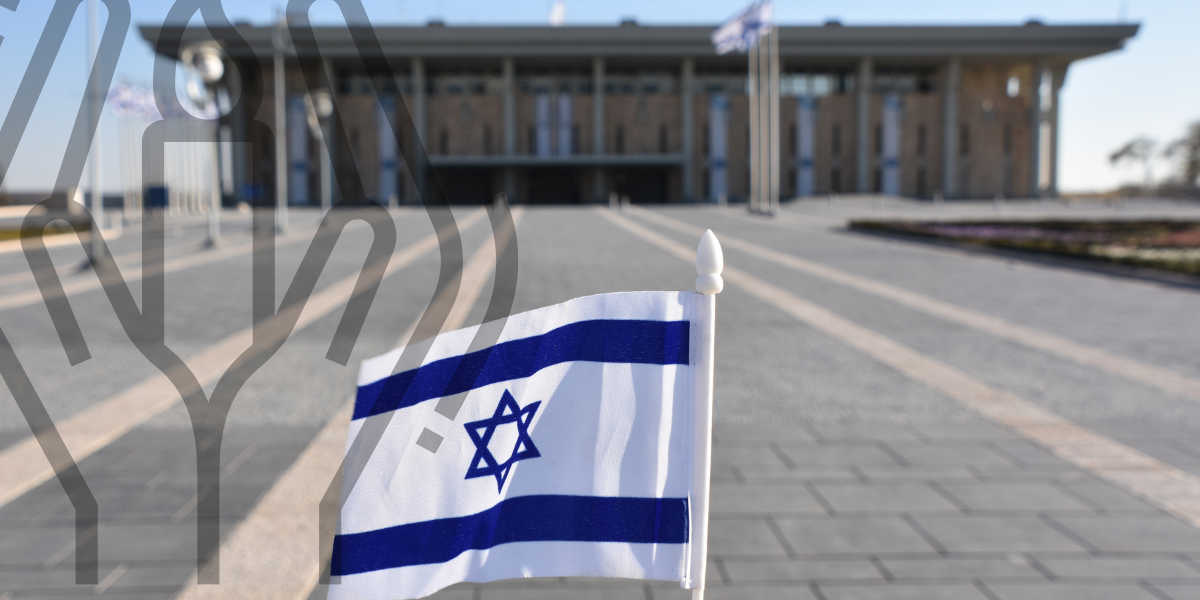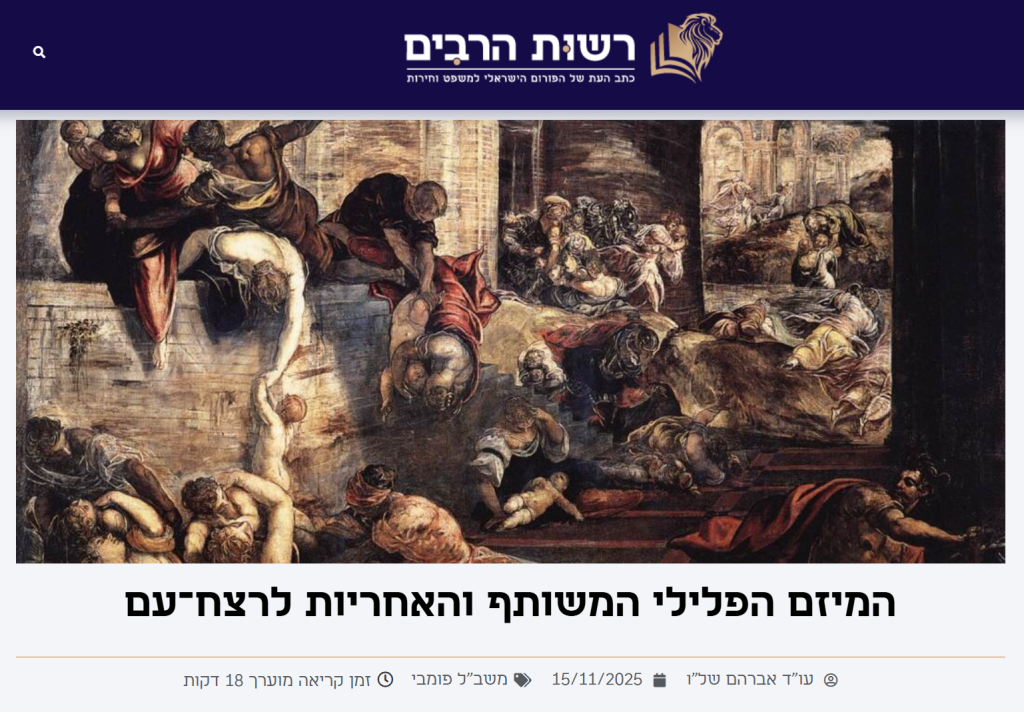While Israel grapples with the costs of war, the Knesset continues to ratify new commemoration projects to the tune of millions of shekels, without any clear policy or budgetary oversight.
This winter, Israeli citizens are not being deluged by rain alone. Without much fanfare, Knesset Members from various parties are showering the public with laws to commemorate the lives and legacies of various personalities who left their mark on the Israeli landscape, both before and after the state’s establishment. On January 14th, the Knesset passed the Commemoration of Rabbi Haim Druckman Bill, 2024 in its third reading. Two weeks later, on January 27th, so too was the Commemoration of Rabbi Ovadia Yosef Bill, 2024.
In addition to these two laws, various legislative proposals to commemorate other figures are at different stages of preparation in the Knesset: On December 18, 2024 the Knesset plenum approved in a preliminary reading the Commemoration of Rabbi Abraham Isaac Hacohen Kook Bill (Commemoration of His Life and Achievements), 2023; at the beginning of the month (5 February), the Knesset plenum approved in a preliminary reading the Center for the Commemoration of the Memory of David Levy Bill, 2024; and the Knesset plenum is shortly expected to vote in a preliminary reading on a bill to commemorate Rabbi Avraham Shapira and Rabbi Mordechai Eliyahu. Two bills to commemorate Golda Meir, a bill to preserve President Yitzhak Navon’s legacy, and a bill to commemorate Hannah Senesh have also been placed before the current Knesset for preliminary discussion. In addition, another bill placed for preliminary discussion calls for the Museum of the Jewish Fighter in Latrun to be named after former President Chaim Herzog.
Beyond the laudable intention to cultivate a national heritage for future generations, this flood of bills has political and symbolic significance as well as financial and organizational costs. Since these proposals have received relatively little media attention, I hope to increase public awareness and offer elected officials a practical proposal on this issue.
State Commemoration of Public Figures in Israel: Background
Until recently, the Knesset for decades chose to officially commemorate – through the state apparatus –mainly Presidents and Prime Ministers. The commemoration was carried out either by establishing a statutory corporation, i.e., a body legally separate from the state and thus relatively independent despite being funded by it, or by establishing a public council, also state funded but not legally separate. The Israeli legislature decided to officially commemorate several key figures through statutory corporations: Former President Yitzhak Ben Zvi, through the Yad Izhak Ben-Zvi institute, established under the Yad Yitzhak Ben-Zvi Law, 5729-1969; former Prime Minister David Ben Gurion through the statutory corporations of The Ben-Gurion House (“Bet Ben-Gurion”) and the Ben-Gurion Heritage Institute, established under the 1976 Ben Gurion law; former Prime Minister Yitzhak Rabin through The Yitzhak Rabin Center established under the Center for the Perpetuation of the Memory of Yitzhak Rabin Law, 5757-1997; former Prime Minister Menachem Begin through The Menachem Begin Heritage Center, established under the 1998 Menachem Begin Commemoration Law; and former President Zalman Shazar, through The Zalman Shazar Center established under the 2010 The Zalman Shazar Center for Jewish History law. It should be noted that two of these institutions – Yad Izhak Ben-Zvi institute and The Zalman Shazar Center – do not focus only on the legacy of their namesakes but engage in broad and varied research work.
The Israeli legislature also chose to commemorate a number of elected public figures and central Zionist figures who died before the state was established through public councils: All former Presidents and Prime Ministers are commemorated through The President and Prime Minister Memorial Council, established under the 1986 President and Prime Minister Memorial Law; founder of the Zionist movement and President of the World Zionist Congress Theodor Herzl, through the Public Council for the Commemoration of Binyamin Ze’ev Herzl established under the Binyamin Zeev Herzl (commemoration and achievements), 5762-2004 Law; Revisionist Zionism’s founder Ze’ev Jabotinsky through a public council established by the 2005 Jabotinsky law; and former Minister Rechavam Ze’evi through a public council, established by law in 2005.
It should be noted that many former prime ministers and public figures are also commemorated through public benefit companies or NGOs such as Yad Chaim Weizmann, Yad Tabenkin, The Golda Meir Institute and others. These bodies are granted annual allowances from the State budget.
In summation, all former presidents and prime ministers are commemorated by the state through the activities of a public council established especially for this purpose. Two presidents and three prime ministers are also commemorated through statutory corporations (with David Ben-Gurion being commemorated via two of them), totaling six statutory commemoration corporations. Alongside the former presidents and prime ministers, two central figures in the history of Zionism and one former Israeli minister are also commemorated through a unique public council for each one.
There seems to be if so, a consistent decision to commemorate all former presidents and Prime Ministers through a public council; however, there is no systematic, consistent desire to do so through statutory corporations or any consistent rule regarding when establishing a public council for other prominent historical figures is called for. It is an open question why a state commemoration corporation is justified for Presidents Ben Tzvi and Shazar, but not Chaim Weizman, or why Herzl and Jabotinsky were commemorated with their own public councils while others, representing other schools of thought in the early settlement and Zionist movement – like central literary figure Ahad Ha’am, and father of religious Zionism Rabbi Kook- were not. And while Rehavam Ze’evi was the only Minister murdered while in office, which was the rationale for his commemoration through public council, many ministers who served in Israeli governments throughout the years had no less impact on public policy and contributed no less to Israeli society. Some of them served in security positions as Ze’evi did, and reasonable claims can be made for their commemoration as well. This data reflects an absence of any overall consideration or ordered, systematic policy on the part of Knesset members and elected officials when it comes to commemorating public figures.
It seems that in the last twenty years, this state of affairs has encouraged members of the Knesset from various factions to submit bills to commemorate other figures through statutory corporations or public councils, but until the current Knesset’s term, no such proposal had yet reached an advanced legislative stage. The coalition agreements that enabled the formation of the current government—the thirty-seventh—included clauses guaranteeing the establishment of two state commemoration bodies for three individuals who served as Chief Rabbis of Israel: The coalition agreement between the Likud and Shas parties stipulates that a government bill for commemorating Rabbi Ovadia Yosef and the study of Sephardic Jewish heritage be brought for Knesset approval as soon as possible (section 203 of the agreement), while the agreement between the Likud and Otzma Yehudit (Jewish Strength) parties stipulates that a law be enacted to commemorate Israel Chief Rabbis Rabbi Avraham Shapira and Rabbi Mordechai Eliyahu (section 123 of the agreement).
Coalition promises and reality taking its natural course – Rabbi Chaim Druckman passed away in December 2022 and former Minister David Levy passed away in June 2024 – were quickly translated into a series of bills by coalition members or with their participation to commemorate prominent figures. Bills of commemoration were also put forth by opposition members – such as for Golda Meir and Hanna Senseh – but have not yet been deliberated on in plenum.
The Effects of the New Laws and Bills for Commemoration
These laws and bills do not only fail to respond to the need for governing principles and an ordered policy regarding the commemoration of public figures but exacerbate the already existing problem. The law for commemorating Rabbi Druckman is the first to establish a statutory corporation for someone who served as neither President nor Prime Minister. Rabbi Druckman was a towering Rabbinic figure, with achievements in education, settlement, Jewish conversion, politics (he served as MK in 1977-1988, 1999-2003 and deputy minister between 1981-1983) and more, as well as an Israel Prize Laureate for lifetime achievement in the area of conversion. However, it is unclear why he should be commemorated through a statutory corporation while most presidents and prime ministers have not been so honored. It is further unclear why former Knesset Speakers or Supreme Court Presidents should not also be so commemorated.
Moreover, this opens up a new set of questions – why should a statutory corporation be reserved for Rabbi Druckman, and not many other renowned Rabbis from his religious stream such as Rav Goren and Rabbi Moshe Tzvi Neria. It is telling that the Otzma Yehudit party is now promoting a bill to commemorate former religious Zionist Chief Rabbis Rabbi Shapira and Rabbi Mordechai Eliyahu with their own statutory corporations, as was anchored in their coalition agreement. It is further unclear why all religious Zionist Rabbis should not be commemorated through a single statutory corporation, as this author suggested in a memo to MKs last November.
The picture becomes even more complicated when considering the law to commemorate Rabbi Ovadia Yosef, which states that the Rabbi will be commemorated through a public council. Among other things, the law establishes that the Jerusalem Municipality will be authorized to establish a municipal commemoration corporation for the Rabbi within its jurisdiction (section 15 of the law). Rabbi Ovadia Yosef is considered one of the greatest rabbis of the last hundred years. He established an enormous Torah enterprise, won the Israel Prize for Torah literature, served as the Sephardic Chief Rabbi (the Rishon LeZion) and was a great halachic authority and spiritual leader of the Shas party, which represents a central stream in Israeli politics. However, the passage of the law to commemorate Rabbi Ovadia Yosef and the preliminary reading approval of the bill to commemorate Rabbi Kook raise an additional question about commemorating figures: What criteria is used to decide whether a rabbi will be commemorated through a statutory corporation or through a public council?
The lack of clear policy and the subsequent organizational cumbersomeness this produces also generate ever growing budgetary costs, as more and more bills are proposed and entered into the law books. According to the laws that created them, all public councils and all statutory corporations are government funded. In 2023, for instance the PMO granted The Ben-Gurion House more than 3.2 million NIS, the Ben-Gurion Heritage Institute over 7.5 million NIS and The Yitzhak Rabin Center more than 11.8 million; the Ministry of Finance granted The Menachem Begin Heritage Center 12 million, and The Zalman Shazar Center received a total of 12.5 million NIS from the Ministry of Culture and Sports and various initiatives in collaboration with other ministries. It should be noted that commemoration corporations are permitted to fundraise and have done so; however, the bulk of their budget comes from the taxpayers.
In addition to the public budgets allocated to the commemoration councils and state commemoration corporations, the government also subsidizes private commemoration associations. For example, in 2023, Yad Chaim Weizmann received 550,000 NIS from the Ministry of Culture and Sports, Yad Levi Eshkol received over 600,000 NIS from the PMO, and the Golda Meir Institute received over 170,000 NIS, and the Peres Center for Peace and Innovation received over 1.09 million NIS from both the PMO and the Ministry of Finance.
The law commemorating Rabbi Chaim Druckman is the first to stipulate the sums of money to be transferred from the state treasury to the commemoration center in the law itself: two and a half million NIS in 2025 and 2026, and five million NIS each year beginning in 2027 (Article 25 of the law). That is, the legislature sought to create a rigid budgetary framework – in law rather than through regulation – for the establishment and operation of the center, and was not satisfied with the general determination existing in the laws that established other commemoration corporations, according to which the center’s activities would be financed from the state budget “as required for its existence, maintenance, development, and management of all its activities.”
Moreover, unlike the Yitzhak Rabin Center and the Menachem Begin Heritage Center, the law provides that not only donations but the state budget – perhaps primarily- will also fund the establishment of the complex in which the center is to be located. The public council for commemorating Rabbi Ovadia Yosef will also be financed through a state budget (section 14 of the law), as longstanding councils commemorating figures are thus financed, as mentioned.
Commemoration of Public Figures in Israel: The Way Forward
To paraphrase the Sages, while the desire to commemorate has no end, the state budget does. This is particularly true in times of budgetary deficit and the need to finance the costs of the “Swords of Iron” war. The lack of any ordered, articulated, long-term and transparent policy for state commemoration serves as an impetus for a “race” to commemorate more and more figures dear to the hearts of various MKs and Ministers from all parties. This race may well continue unabated into the next election cycle, at the expense of the general public, further bloating a public sector already in great need of improvement and optimization (see, for example, unnecessary ministries) as well as cheapen the idea of public commemoration.
It is therefore incumbent upon the current government to establish a public committee without delay to review the issue of state commemoration of public figures, gather relevant professional material, hear expert opinions and formulate a global, long-term framework to be published in its summary report. Such a framework will dictate the standards for state commemoration of public figures, as well as the principles governing the method and structure for doing so (by public councils, statutory corporations etc.) as well as sources of funding. All these will be translated into legislative bills. At the same time, it is recommended that all legislation of further commemoration be halted until the committee publishes its conclusions.
Let it be so, “for the glory of the State of Israel”!
(First published in Hebrew in Mida)




